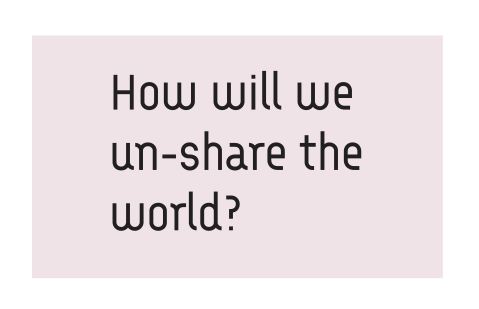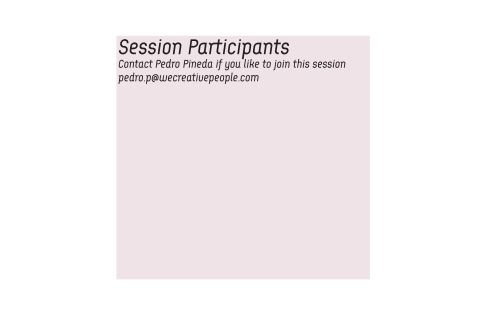Review: People in Beta (session) @ Convention Camp 2012
January 2, 2013 § 1 Comment
Outcomes
We engaged with the Convention Camp visitors in 3 ways:
- Provoking dialogue and filtering keywords. We aim to find out what things people are doing and thinking about.
- Opening the discussion to all. We could find out what are the patterns, and from those patterns which ones are relevant to the Convention Camp audience.
- Creating a story. We transformed those insights into two short films. Thus sharing a reflection about the Convention Camp at the end of the day.
During the discussion, a woman told us: “If I share, I lose!”. But this isn’t a fear of losing that what you share, rather a fear of losing control over what you share. Once you share something you can’t choose what other people might do with it.
The two stories develop through the session reveal two different perspectives on sharing
Story 1: Sharing is Caring (Link to movie)
This is the story of a maker. That person that sees a problem and makes a solution. He feels that current platforms limit what he wants to say, so he creates the platform -sharing is caring- to have total control of what he shares, with who, when and how. This start-up shows how different people will benefit from more control over their -sharings-. The story illustrates a trend towards more control of the user over the data and how this will foster even more sharing.
Story 2: The limits of Control (Link to movie)
This is the story of corporations. They also see the opportunities of sharing. Companies see how by creating spaces for employees to exchange, get to know each other and share insights they will improve their innovation. Many are open to trial those processes, however if this culture is not truly understand, they risk a shallow margin in their innovation culture, and quickly being copied by other companies.
We can see how some initiatives have understand well the boundaries of sharing and provide you (the user) with certain aspects of security so that you know that you can control it: AirBnB give you insurance so that you know your home is safe; betahaus makes sure you always have a place to work; google documents allow you to share your document with those who you want to work, or make it public.
Those initiatives, inspired by our needs, learned how they can foster sharing by giving the user control of certain parameters.
Reflection
Talks and presentations at conferences are not any more sharing something new. Most projects and presentations can be find online long before the conferences happen. Instead conferences are a great place where people go to meet other people. And is through the discussions that arise between them, that new ideas and concepts emerge.
People in beta (session) / Convention Camp 2012 from Nina gleich on Vimeo.
Our process was in beta, changing through the day to adapt to the challenges and opportunities of the event. While we are very excited about the results and possibilities of the process we know this is a prototype and where looking about what aspects could be improved:
- Engage a bigger audience: We want to design a better communication strategy to give the possibility to more people to participate
- Integrating the video team before: We need to better understand what they need to make the story understandable, and they need to understand our findings
- Release the video before. To have the biggest impact people have to know this video will be produced, and the video have to be shown in time for people to discuss it.
Nevertheless we still brought something new to the conference
- The opportunity for people to see how the process work live.
- We added a more collaborative, open and reflective dimension.
Our process was a real experience of what it means to be beta, something that most people might not see everyday and might have provoked them to think different.
You can read about the concept and team here
Post written by Pedro Pineda
People in Beta (session) @ Convention Camp 2012
November 22, 2012 § 1 Comment
The Idea
You can’t get creative insights sitting behind an office desk. Everything is more or less predictable and contradictory things can be left outside. Out in the world, it’s more chaotic. You have to deal with unexpected findings, with uncertainty, and with irrational people who say things you don’t want to hear. But that is where you find insights.
That is why at the convention camp, we are not making a presentation of how we work, neither telling about our successful stories, nor our failures. We are venturing in the convention camp pursuing learning without any hypothesis or script, but to challenge our comfortable assumptions (and the ones o of its visitors)
We want to know How will we un-share the world in the future? We want to learn about the limits of openness, connectedness and sharing. And imagine scenarios which narrate our insights into a story. This story is a spontaneous reflextion of what happened at the convention camp, and we will share it at the end of the day with all.
The Process
This process should not be seen as a fix scientific structure but rather functions as the drum’s player in a jazz concert. It serves as a reference for participants and it might be spontaneously updated, changed or ignored depending on the flow.
Part 1: Gathering insights (Open to all)
- 9:00 – 10:00; betabreakfast
- 10:00 – 12:00; Scout the convention looking for insights
Part 2: Understand insight and find out patterns (Open to all)
- 13:30 – 14:00; Cluster insights
- 14:00 – 14:50; Open* Discussion
(*The discussion is open for all to participate, but be aware that it is facilitated and that might get uncomfortable)
Part 3: Creating stories
- 15:00 – 16:30; Envisioning scenarios, Session*to translate ideas into tangible stories.
- 16:30 – 16:45; Present and film scenarios
- 20:00; Present video with the visualized story.
(*Session for 20 participants, contact pedro if you like to take part)
The session is inspired by betahaus which is a co-working space. Here things are not predictable, some things are very contradictory and irrational people try to change the world.
Team
The session will be kickstarted by Anne, Alessandro, Rick, Maximilian, and Ricardo. All from different backgrounds, have never work together before, do not even have an action plan, but are all co-workers willing to get out of their comfort zone.
Ricardo Ferrer (@ricferrer): The generalist
Ric Ferrer is founder and chairman of the advisory board at 533 AG, a company he started recently in order to support and fund projects related to “the future of work”. He is co-founder of the coworking space EDELSTALL (http://edelstall.de) and the cloud storage start-up doctape (http://doctape.com) where he is currently working full-time as Chief Creative Officer. He uses his extensive experience in management, design and programming to advise and help in the conceptual design on all projects he is involved with. Having been raised in Venezuela, gone to school in the U.S.A. and spent big part of his adult life in Germany, his multi-cultural background serves him well in order to predict the needs of an emerging digital generation of nomadic professionals.
Maximilian Doerner (@maximiliandoe): The Futurist
Max Dörner is a Future managment researcher and Business Anthropologist engaged in a multitude of fields including future analysis and foresight, design thinking as well as business culture and innovation management. He uses integrative, interdisciplinary techniques to determine complex contextual problems, and solve them. Working as a Marketing Executive, Analyst and Consultant in different industry fields such as marketing, design and innovation he has an array of viewpoints to draw upon and contribute. Born in Germany, raised in New Zealand, he studied Anthropology and Ethics, continued on to do postgrad in Development Studies in NZ and Berkeley,California. He then returned to Berlin to complete his masters in future studies.
RicK Scavetta (email): The Optimist
Rick Scavetta was born in Toronto, Canada and completed his Ph.D. in Germany at the Max Planck Institute for Evolutionary Biology. In addition to Canada and Germany, Rick has also conducted parts of his training in Singapore and Iran. Throughout his academic career, Rick has consistently been engaged in student leadership, actively promoting the personal and professional development of his peers. Thus, it was a natural transition for Rick to go from the laboratory to a research support role as a co-founder of Science Craft. Science Craft is dedicated to offering outstanding transferable skills training to graduate students in the life sciences. Since it’s foundation in February 2012, Science Craft has attracted growing interest from many top-level research institutes in Germany and will begin offering international workshops next year. Rick combines his infectious enthusiasm for science and its communication with a unique ability to inspire life scientists in their career development.
Anne Kjær Riechert: The Dreamer
Anne is a 2006 graduate from the KaosPilots in Denmark. From 2006-2009 she worked as creative lead and corporate social responsibility consultant for the Copenhagen-based brand strategy company, Stoic, where she amongst others developed and implemented Samsung Electronics award-winning CSR strategy for Scandinavia. Since 2006, Anne has also managed her own humanitarian project, We Have a Dream, which organizes global workshops to empower youth through drawings and discussions about their dreams for the future. The project has reached over 3000 children in 22 countries. Anne exhibits the drawings in public and political places to increase awareness and raise funds for children growing up in disadvantaged areas.
Alessandro Contini: The Realist
Alessandro Contini is a designer and a tech savvy. He works with sounds, images and coding. After graduating in Computer Science with Music Technology in Milan he started collaborations with international companies such as Interaction Design Lab, Nokia, Eyebeam Art + Technology center for the Arts, and taught classes at Milan Polytechnic University, NABA and Domus Academy (Laureate International Universities). Currently he’s a freelance creative technologist, interactive artist and regular hackathon-goer!
Pedro Pineda (@pedropiba): The Connector
Born in the Canary Islands (1985) , Studied Design & Technology in London and now is living in Berlin where he is developing different ways to apply collective & creative problem solving to challenges that affect us as individuals or as society. He sees design as a tool to create and facilitate experiences. It “is not enought to look at the isolated product or service but at the whole experience that we want to create” His work is released open source for all to copy, build upon and distributed.
He has co-developed numerous projects like MakerLab, Enable Berlin, We Creative People, and Open Design City. He has co-developed numerous projects like MakerLab, Enable Berlin, We Creative People, and Open Design City
People in Beta
April 5, 2011 § Leave a comment
How are coworking spaces an extension of the environment often found in universities? How does competition fare vs. collaboration in a coworking space? Why is coworking a better alternative for freelancers who usually work at home? “People In Beta” begins a conversation on these topics and invites your participation (twitter: #peopleinbeta #futureofwork). KS12
Finally, some documentation about what is happening in the co-working scene in Berlin. It would be also great to know what is happening in another co-workers spaces around the globe. One thing is for sure, collaborating we build together our society and its future, one that has a little bit from each one of us.
KS12 is developing a conversation between intervies so that the documentaries have another sense of continuity, and making the process more collaborative. They call it Mad Hatter’s Tea Party technique
This created a high level of continuity in the interviews as people responded to and iterated on each other’s answers… In many ways the Mad Hatter’s Tea Party is like a performative brainstorm.
Check more of their work at KS12

